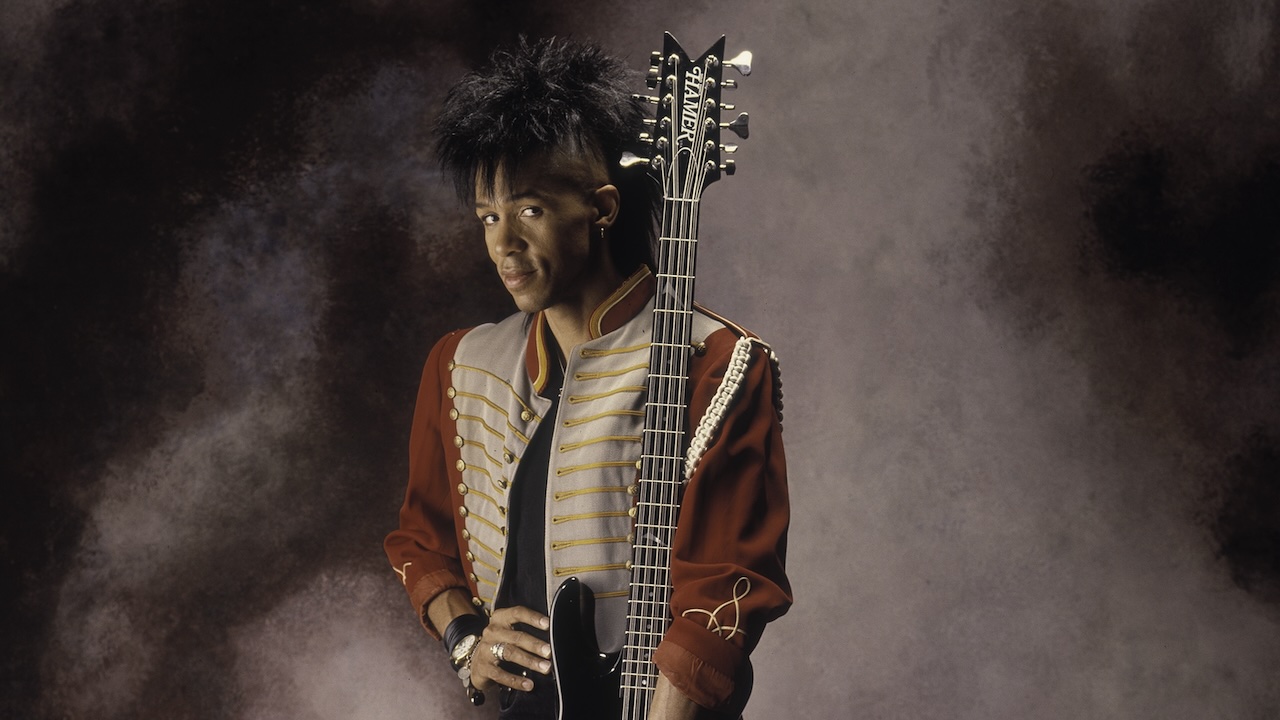“I play chords on the bass like a bluegrass or country picker would. It really works with the 12-string”: Dug Pinnick on pushing hard rock’s boundaries with King’s X
Dug Pinnick’s onstage presence with King’s X is made even more compelling by his unusual 12-string bass guitar

All the latest guitar news, interviews, lessons, reviews, deals and more, direct to your inbox!
You are now subscribed
Your newsletter sign-up was successful
In the league of progressive power trios – Cream, the Jimi Hendrix Experience, Mountain, Rush, and Primus – King's X is an unsung MVP. Since the 1980s, the Houston-based group has pushed hard rock's boundaries with drop tunings, lush vocal harmonies, and heavy blues-based riffs delivered with soul music's stomp and swagger.
Among its three talented vocalist/instrumentalists, dUg Pinnick can be loosely described as the band's frontman. But the lanky southpaw's commanding onstage presence – made even more compelling by his unusual 12-string basses – is undeniably captivating.
“I like to play chords on the bass guitar like a bluegrass or country picker would,” Pinnuck told Bass Player. “I like using open strings to create drones. For example, I fret the root note and complete the chord by strumming open strings. It works really well on the 12-string. I used it on songs like Haven't Been Here Before and Change from my 2005 album Emotional Animal.”
2005 was a busy time for Pinnick. Following the release of Live All Over the Place, a two-disc compilation of live King's X material, the band also released its 13th studio effort, Ogre Tones.
Meanwhile, Pinnick furthered his solo career with Emotional Animal, and a collaborative project with Pearl Jam's Jeff Ament.
This interview from the Bass Player archives took place in December 2005.
Some of the material you've written with King's X is rather complex. Did you study music formally?
All the latest guitar news, interviews, lessons, reviews, deals and more, direct to your inbox!
“I did study music theory in college. But I am a ‘feel’ person – I don't pay too much attention to the analytical side of music. Throwing out musical ideas the way I feel them – without too much thought – works best for me. The inspiration and ideas come from a different, more direct source.
“There are songs on Emotional Animal which remain on one chord.
“Are You Gonna Come was created around a single looped bass riff and stays in one key, as does Noon. Instead of using lots of chord changes, key changes, and time changes, I decided to challenge myself by keeping these songs in one tone center. Other instruments and vocals create the sense of movement. I don't know if it works or not, but it has been a fun experiment.”
What was your writing process like for Emotional Animal?
“Drums come first. I ask myself, ‘Do I feel like marching, rocking like AC/DC, or banging my head?’ I program ideas on a drum machine, lay down guitar parts, and then I add bass. Bass is the last instrument, and that is the fun part for me. I can create bass parts to complement the guitar easily, but I have difficulty creating guitar parts to fit my basslines. Vocal melodies and lyrics are last.”
With King's X, are you all in the same room when you record basic tracks?
“We play as if we're performing live. Jerry Gaskill is in the big room on the drums. Ty Tabor and I are in the control room without headphones, listening to the monitors and playing along.”
In addition to King's X and your solo work, you are often involved in other musical projects.
“Music is all I do – I don't have a life outside of it. My project with Jeff Ament has been almost done for a couple years now, but both Jeff and I have been too busy to finish it. I do really want to get it out for people to hear, though. I'm really excited by it.”
Do you find it challenging to sing and play at the same time?
“When I started 30 years ago it took time to sync the two up, but it comes naturally now. Now I try to come up with the most challenging riffs and vocal patterns just to keep my skills fresh ... and to show off a bit!”
Tell us about your bass rig.
“I call it my Frankenstein monster. I've always admired and emulated the tone of John Entwistle and Chris Squire: ‘wiry’ with a rich bite and clear definition. The concept is simple but achieving it has been challenging. I run a bass rig and a guitar amp together so l have dedicated amps for low and high frequencies. And I use a pick because it makes the attack more pronounced.”
How often do you tune down with King’s X?
“Some songs on Ogre Tones are in drop C tuning and others are in drop D or B. It really depends on what I was doing when I wrote the song – what instrument I happened to pick up at the point of inspiration.”
“Live, we transpose songs up or down a step so we don't have to switch guitars as often, and because the lower keys that sound great on recordings sometimes get too murky onstage.”
Have you found any challenges by being a left-handed player?
“I started out playing a right-handed bass flipped upside down. After about six months a friend told me that I could restring the instrument. I did, which made it much easier to play. It means I can't spontaneously jam with confidence on a reversed instrument, so I sometimes miss out on informal jamming with people. I can still play guitars that are flipped over, but not without thinking.”
What do you find most challenging about playing bass?
“Coming up with good driving basslines is challenging. I prefer to make up melodies with the bass and to not simply follow the guitar riffs. Other players may challenge themselves with technical skills, but for me, bass is not technical at all. It's a primal, tribal thing. I am a Black person who grew up with soul music, so the bass has always been the number one influence for me.”

Nick Wells was the Editor of Bass Guitar magazine from 2009 to 2011, before making strides into the world of Artist Relations with Sheldon Dingwall and Dingwall Guitars. He's also the producer of bass-centric documentaries, Walking the Changes and Beneath the Bassline, as well as Production Manager and Artist Liaison for ScottsBassLessons. In his free time, you'll find him jumping around his bedroom to Kool & The Gang while hammering the life out of his P-Bass.



